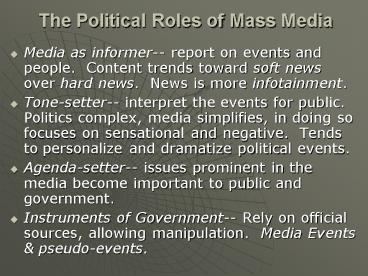The Political Roles of Mass Media - PowerPoint PPT Presentation
1 / 13
Title:
The Political Roles of Mass Media
Description:
CNN-Effect--claim that events in the world aren't politically important in the ... TV news focuses on dramatic, the negative and human interest. ... – PowerPoint PPT presentation
Number of Views:146
Avg rating:3.0/5.0
Title: The Political Roles of Mass Media
1
The Political Roles of Mass Media
- Media as informer-- report on events and people.
Content trends toward soft news over hard news.
News is more infotainment. - Tone-setter-- interpret the events for public.
Politics complex, media simplifies, in doing so
focuses on sensational and negative. Tends to
personalize and dramatize political events. - Agenda-setter-- issues prominent in the media
become important to public and government. - Instruments of Government-- Rely on official
sources, allowing manipulation. Media Events
pseudo-events.
2
Other Roles of Mass Media
- Political Socialization
- Entertainment Market forces even news media to
focus on entertaining. - Watch dogs of government, reporting on scandal.
Take an adversarial role in order to appear
objective. - In politics, if the media does not report on an
event, does it really happen? Will the people
even care? Will politicians care? - CNN-Effect--claim that events in the world arent
politically important in the U.S. unless the
media reports on them.
3
Critical president/press relationship
- The relationship involves high stakes for both
-leads to a relationship that can appear
antagonistic, but one that is usually
cooperative. - Likened to a rocky marriage. Each needs the
other. Text calls this symbiotic. - Stakes for the President-- Image building to
have support of the public. Leading public. - Stakes for the media--
- President biggest ongoing story. Americans want
news about the president. - Presidents are dramatic, drama sells. and
prestige.
4
Evolution of Print and Broadcast Media
- 19th media was very partisan. Early 20th century
focus was on Yellow Journalism and Muckraking. - Print now--large newspaper conglomerates
important papers of record (e.g. NY Times) and
news magazines. - News has become very generic w/ corporate
consolidation. Much less variety in info.,
despite of channels. - Broadcast media-- Radio and TV. Controlled by
media giants, and now conglomerates (e.g. Time
Warner-AOL, Disney-ABC). Their focus is profit,
not being informative.
5
Most people get news from TV most, and they trust
TV most.
6
Evolution of the Press in Politics
- Pervasiveness of the media in politics has
increased w/ technology. - President Franklin Roosevelt (1930s) started
press conferences. A Cozy relationship between
the press and president persisted through 1960s. - Cozy relationship ended with Vietnam and
Watergate, which led to media cynicism, and a
more antagonistic press. - Nature of coverage has changed
- Superficial coverage, Less covg of politics,
- Incredibly shrinking sound bite.
- Election coverage focuses on horse race instead
of issues.
7
(No Transcript)
8
TV Politics
- PR more important than policy. 1/3rd of
Presidents staff work in PR. - Public image building has become paramount. 1960
presidential election debates. - Elections more about candidates and media events
than issues. - TV news focuses on dramatic, the negative and
human interest. Leads to distorted public view
of politics. - TV defines news in terms of entertainment value.
Soft news is cheaper to produce, more highly
rated, effects the bottom line. - News Profit Ratings/Demographics minus
Production Costs.
9
(No Transcript)
10
Bias in the Media
- Bias NOT systematic against one party or the
other. Ideological bias is usually in the eye of
the beholder. - Bias tends to be against whomever is in office.
- Bias toward Negative coverage. Good news is not
stressed as much as bad news, esp. in elections. - The media still rely on official sources for most
of their information, and favor authoritative
sources.
11
Bias in the Media
- Information Biases in the News that Matter
- Personalization. Oversimplifies, making politics
about personalities, human interest. - Dramatization. Excludes the typical, focusing
instead of novel dramatic. Not representative. - Fragmentation. Simplifies events w/o placing into
larger context confusing viewers. - These biases distort the publics images of
reality, creating the illusion of the news.
E.G. Crime rates.
12
Media Influences on Public Opinion
- Media does NOT tell Americans what to think.
- Media profoundly influence what Americans think
about-- Which issues are important, which
problems Americans think government should
address. - Power of the media has 3 important effects on
American politics - Priming influencing the criteria used to
evaluate political leaders. - Agenda Setting media ? the policy agenda The
issues government pays close attention to and the
problems government attempts to solve. - Framing By stressing certain interpretations,
can influence how the public respond to event.
13
Media Agenda Setting
Events
Public Opinion
Media Coverage
The Policy Agenda
Politicians are responsive to increased public
concerns and will adjust their agendas. Events/iss
ues not covered by media unlikely to reach
agenda. Ignored issues and events fade from
policy agenda.

